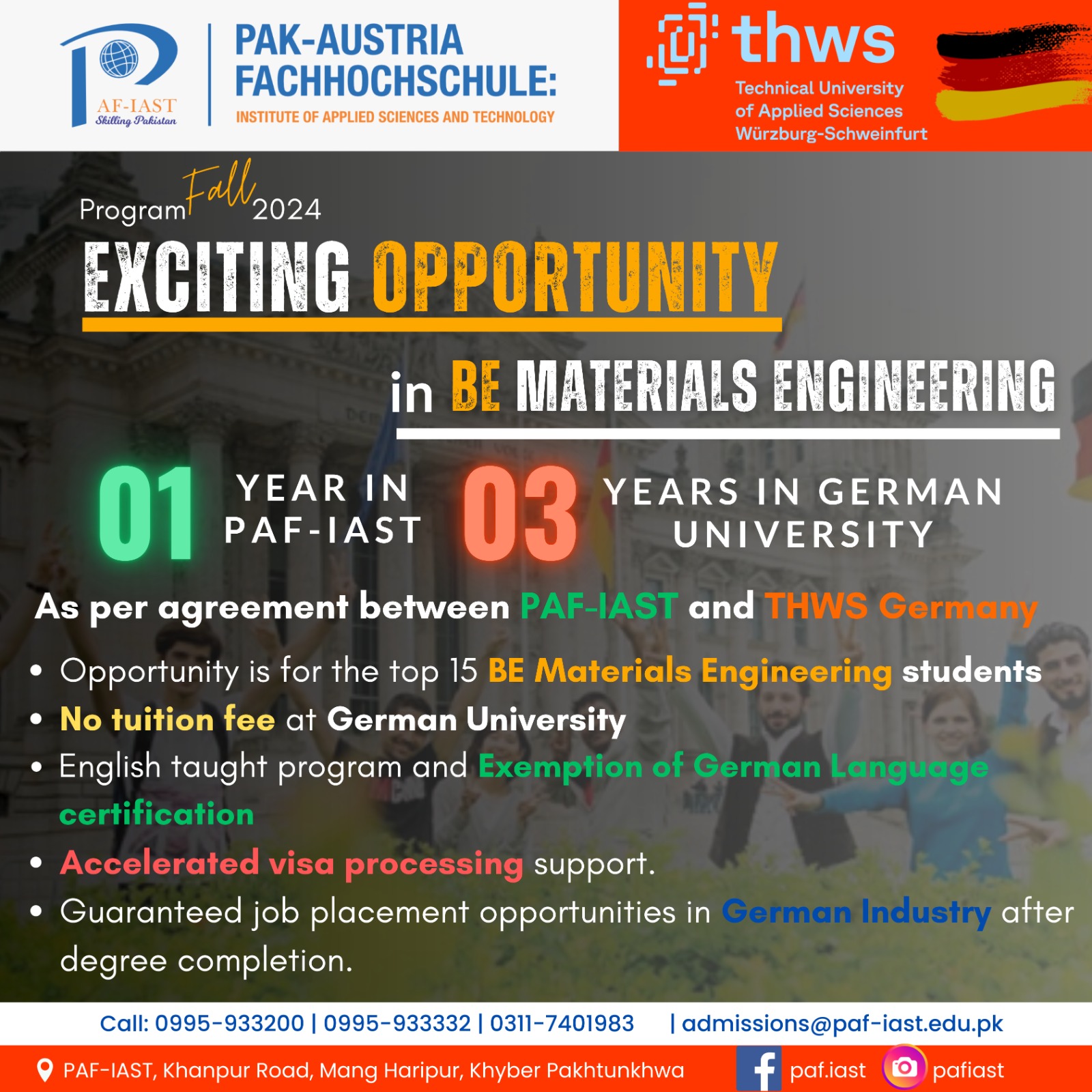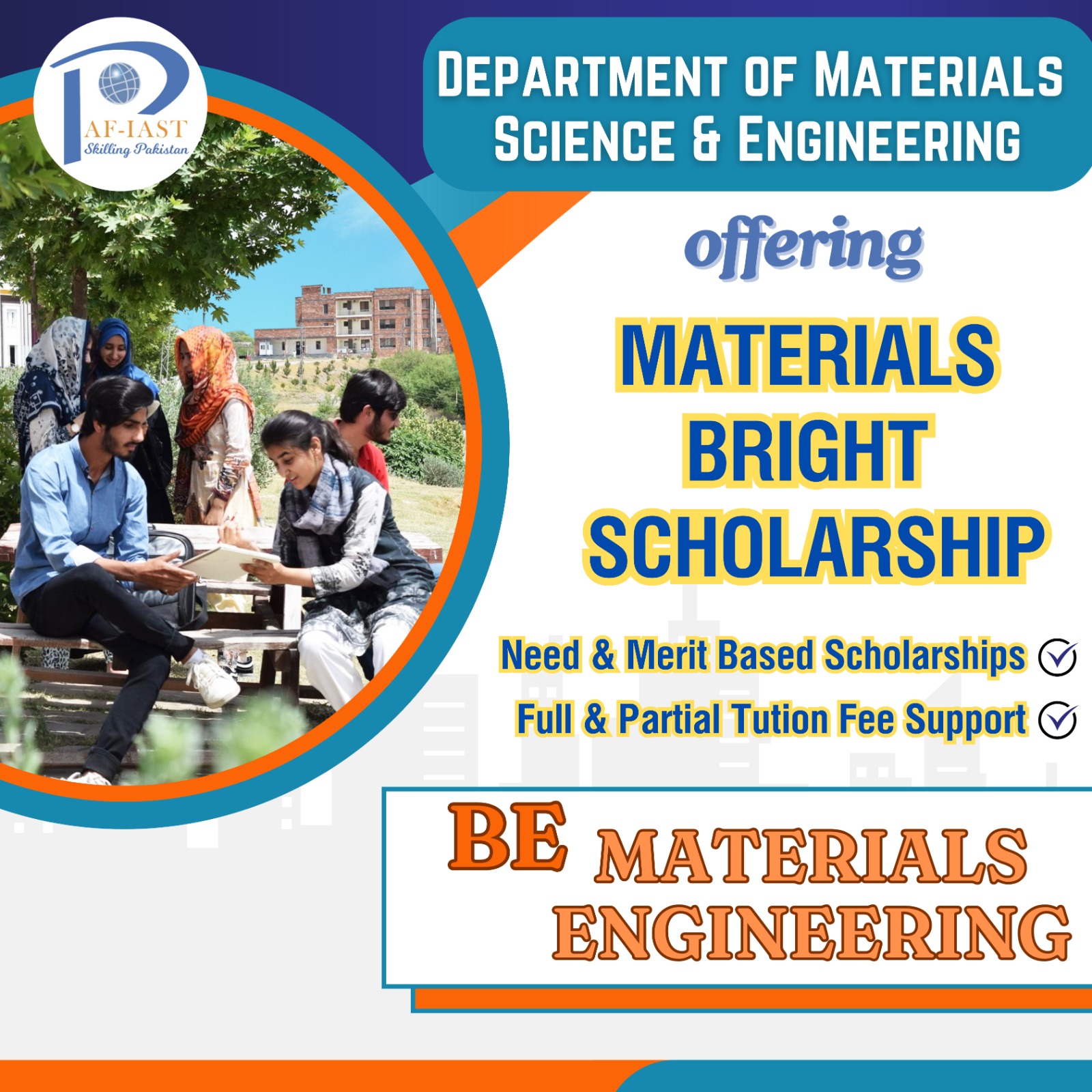As part of our commitment to providing a world-class education, we offer numerous international exchange opportunities at Austria, China and Germany. Through partnerships with esteemed institutions worldwide (University of Applied Sciences Upper Austria, THWS Germany, Chengdu University China)


At PAF-IAST, we are committed to supporting your academic journey by offering various financial aid options and scholarships. We believe that financial constraints should never hinder your passion for learning.
Explore our scholarship programs, including Erasmus+, Ernst Mach, OEAD, and more, to broaden your horizons and gain a global perspective while pursuing your Materials Engineering degree.

The Department of Materials Science & Engineering (DMSE) at PAF-IAST is at the forefront of imparting education and conducting cutting-edge research in materials science and engineering with a focus on skill development in Pakistan. Established in 2021, the department is driven by a vision to empower the nation through advanced materials research and education.
DMSE is committed to designing, creating, and characterizing new materials while also improving existing materials to make a positive societal impact. The degree programs offer a dynamic blend of teaching techniques, delivered by esteemed faculty members who have garnered top-tier materials research ratings. Moreover, through collaborations with renowned Austrian and Chinese universities, DMSE has designed the programs to meet international standards, ensuring that the students acquire both fundamental and applied knowledge of materials.
At DMSE, the faculty members provide students with a profound understanding of the structures, processes, and mechanisms that influence material properties. The department foster an environment that nurtures innovation and challenges students to become forward-thinking problem solvers. By the end of their degree, the students are equipped with the skills to develop materials that fuel the unimpeded progress of technology.
In line with institute’s commitment to excellence and the evolving needs of the materials field, department has recently introduced courses in Artificial Intelligence (AI) and related disciplines. The revised curriculum equips students with the knowledge and skills to leverage AI techniques in materials research, development, and design.
To provide quality education with practical experience as per international standards and bridge academia-industry linkages.
The Department of Materials Science & Engineering is committed to providing quality education through fundamental engineering knowledge and project-based learning. The department aims to prepare graduates who have entrepreneurial acumen and professional skills to provide engineering solutions, by working closely with the relevant industries such extractive metallurgical, mineral processing etc. and research institutes.
The Department of Materials Science and Engineering comprises of dedicated and shared labs. Wide range of laboratory equipment engaged for research and teaching for undergrad and postgrad students. DMSE Labs are also equipped with testing facilities that can facilitate relevant industries and organizations to perform industrial projects and pave a way forward for a strong industry-academia linkage.
Following is the List of Dedicated Labs within the department and Shared Labs with other departments of the institute.
Organic and inorganic Chemistry lab |
1) UV visible |
2) Oil bath |
3) Hot plate with magnetic stirrer |
4) weight balance analytical |
5) evaporator with vacuum pump |
6) Dessicator with vacuum pump |
7) bomb calorimeter |
8) mechanical shaker |
9) UV lamp |
10) furnace |
Workshop practice and Welding Equipment |
Milling machine |
CNC Milling machine |
Lathe Machine |
Shaper Machine |
Piller drill machine |
TIG Welding |
MIG Welding |
Arc Welding |